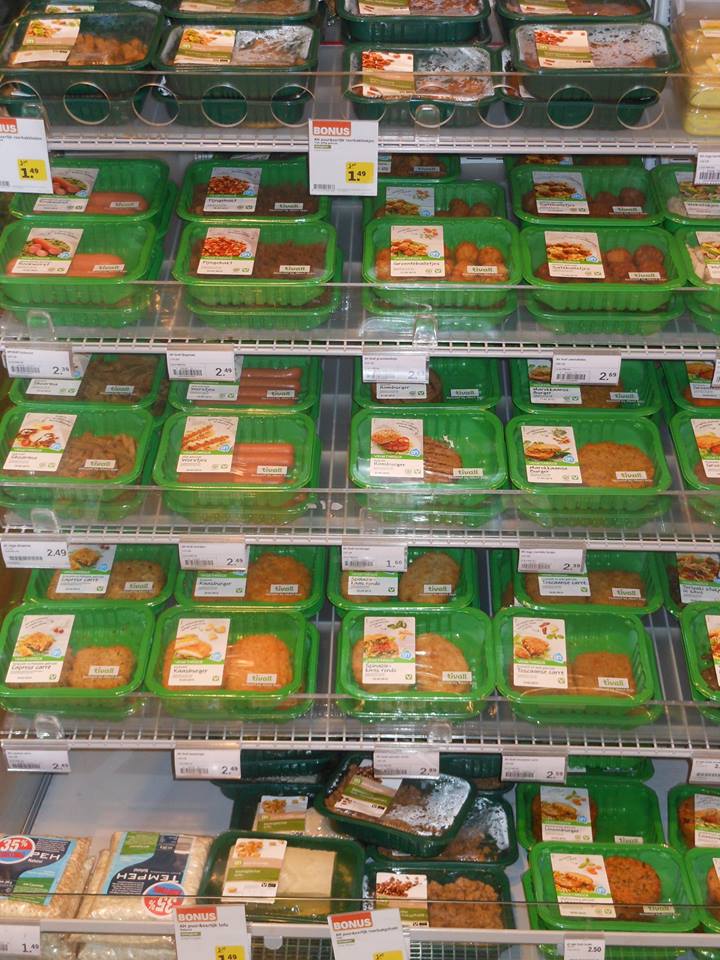Translate This Page
Hail Seitan (and other Meat Replacements)
Some vegans cast a disapproving eye at vegan dishes that closely resemble animal based products. Personally I'm all for them even if they're produced by "Big Industry", because every vegan meal is one less animal based meal. In fact, I see it as a positive development that we're seeing in the shops more and more products from the major food processing
companies and even supermarket own-brand items.
In an ideal world everyone would be susceptible to the arguments for becoming vegan. Even people who are not concerned about the welfare of animals should be able to get behind one or more of the advantages as it is better for their own health, better for the health of the environment and better for the health of their bank balance. Unfortunately, all too often, these
rational and logical arguments are negated by "But I love meat/bacon/cheese etc." When confronted by such stubbornness, it is easy to start to despair at ever making a difference. However, we don't have to convince everyone to become vegan: the widespread exploitation of animals for food could be ended by enough people cutting back on their consumption, so anything that makes that easier is very welcome as far as I'm concerned.
The animal based food industry is a business and it only exists to make a profit. So if it becomes unprofitable, then it will disappear. It's not worried by a small percentage of people becoming vegan or vegetarian. What really scares it is the thought of a significant proportion of the population following the trend towards days without meat, such as "Meatless Monday". If everybody did that it would represent a 14% fall in demand and that would destroy the industry. Although this may seem hard to believe, it is the inevitable consequence of the way business works. Allow me to explain...
Any business that sells anything has to cover its costs before it makes a profit. There are two sorts of costs. Fixed costs or overheads are the basic costs of running the business irrespective of changes in production or sales. They include the cost of the premises, insurance, a proportion of utilities, local taxes etc. Variable costs change with production. In the case of a livestock farm that will include fodder for the animals, vets bills, bedding etc.
Let's take a look at a hypothetical farm: it has fixed costs of £200 per year and a production of 100 animals. The variable cost for each animal is £5 and they are sold for £10 each. So if the farm sells all 100 animals it has an income of £1000 (£10 x 100). Its expenses are £700 made up of £200 fixed costs and £500 (£5 x 100) variable costs. Its profit is £300 which is calculated from income (£1000) minus expenses (£700).
Now suppose that the farm produces 100 animals but, due to a drop in demand, only sells 90 animals. The fixed costs stay the same at £200, the variable costs stay the same at £500 but the income drops to £900.
The profit is then only £200 (900 - 500 -200). So a 10% fall in sales leads to a 33% fall in profit. And, in addition, the farmer is left with 10 animals and the problem of what to do with them: keep them and carry on paying the variable costs and hope to sell them later at the normal or get rid of them at a lower price. This is not necessarily an easy decision to make: if the last 10 animals are sold at a lower price, it might cause a fall in the price for all the animals.
The farmer then has to decide how many animals to produce the following year: if they produce too many again, then they have the same problem and the buyers might take advantage of the over supply by offering less money per animal. If they don't produce enough then they risk losing out on profits. However, if there is a lack of supply compared to demand, then the price per animal might go up. But this will also put up the price that the consumer pays... which might lead to lower demand.
One response of farmers is to try to cut down on costs by creating mega-farms where more and more animals are looked after by fewer and fewer staff. Although, in the short term, this looks like a good idea, in the long term it just exacerbates the problem. One mega-farm may replace a number of smaller farms which leads to a fall in employment in the agricultural sector. This reduces the political importance of agriculture which means that opposition campaigns become relatively more
successful. Employing fewer staff also means that less time is spent on looking after each individual animal. This is in contradiction with the increasing demand by consumers for improved animal welfare.
Another problem that a fall in demand creates is that it makes financing for the industry less attractive. New farms expect to operate profitably for a couple of decades or more and base their business plan on this assumption. However, most lenders are aware that the sector faces multiple challenges and that its long term viability is at risk. This may lead to higher interest rates to compensate for the risk or even a refusal to invest at all as other sectors offer a better and safer return on investment.
Even though I am an abolitionist I applaud anyone who cuts down their consumption of animal based products, as anything that cuts down demand contributes to the decline of the industry. I think that intolerance to non-vegans does a disservice to the vegan movement. It creates an us versus them situation whereas I believe we should allow people some time
to accept the idea of becoming vegan. So let's embrace the meat replacements and encourage more people to try them. We can't do that if we're making them feel bad.

- (Intensive) Animal farming and slaughter for meat/organs and other animal products like dairy products and eggs
- (Intensive) Animal farming (Mammals, Birds and Reptiles) for their skin (leather) and fur
- (Intensive) Animal farming for wool
- (Intensive) Goose farming for down
- Fishing and fish farming
- Circuses, Zoos and Marine Parks
- Animal testing and animals used in medical or veterinary universities
- Hunting and trophy hunting
- (Cruel) Animal Sports like bullfighting and other fiestas, cockfighting, horse racing, greyhound racing, sled dogs racing, pigeon racing, pig wrestling, rodeos etc.
- Pets
- Horse and pony riding
- The use of animals in films
- Zoophilia
- Anti-speciesism and climate change
- What can you do?
